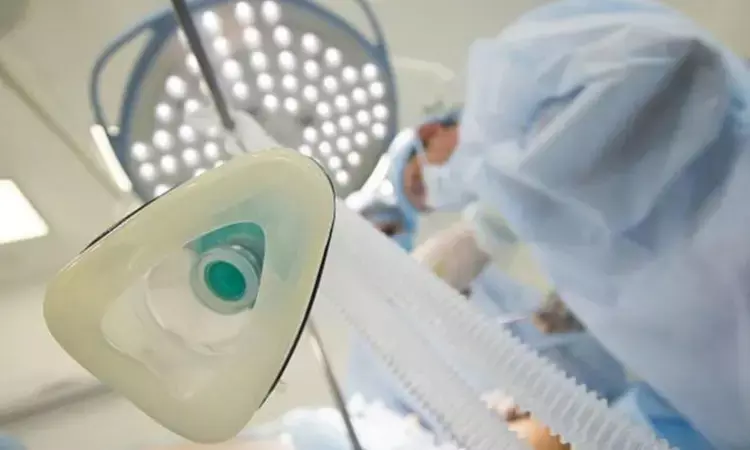- Home
- Medical news & Guidelines
- Anesthesiology
- Cardiology and CTVS
- Critical Care
- Dentistry
- Dermatology
- Diabetes and Endocrinology
- ENT
- Gastroenterology
- Medicine
- Nephrology
- Neurology
- Obstretics-Gynaecology
- Oncology
- Ophthalmology
- Orthopaedics
- Pediatrics-Neonatology
- Psychiatry
- Pulmonology
- Radiology
- Surgery
- Urology
- Laboratory Medicine
- Diet
- Nursing
- Paramedical
- Physiotherapy
- Health news
- Fact Check
- Bone Health Fact Check
- Brain Health Fact Check
- Cancer Related Fact Check
- Child Care Fact Check
- Dental and oral health fact check
- Diabetes and metabolic health fact check
- Diet and Nutrition Fact Check
- Eye and ENT Care Fact Check
- Fitness fact check
- Gut health fact check
- Heart health fact check
- Kidney health fact check
- Medical education fact check
- Men's health fact check
- Respiratory fact check
- Skin and hair care fact check
- Vaccine and Immunization fact check
- Women's health fact check
- AYUSH
- State News
- Andaman and Nicobar Islands
- Andhra Pradesh
- Arunachal Pradesh
- Assam
- Bihar
- Chandigarh
- Chattisgarh
- Dadra and Nagar Haveli
- Daman and Diu
- Delhi
- Goa
- Gujarat
- Haryana
- Himachal Pradesh
- Jammu & Kashmir
- Jharkhand
- Karnataka
- Kerala
- Ladakh
- Lakshadweep
- Madhya Pradesh
- Maharashtra
- Manipur
- Meghalaya
- Mizoram
- Nagaland
- Odisha
- Puducherry
- Punjab
- Rajasthan
- Sikkim
- Tamil Nadu
- Telangana
- Tripura
- Uttar Pradesh
- Uttrakhand
- West Bengal
- Medical Education
- Industry
Propranolol effectively reduced sedative need in critically ill patients during pandemic: Study

A new study published in the journal of Critical Care Medicine showed that in severely sick patients treated during the COVID-19 epidemic, propranolol successfully reduced the requirement for sedatives.
Guidelines suggest dexmedetomidine and propofol as first-line sedatives for critically sick patients who frequently need sedation to tolerate mechanical breathing. Propofol shortages occurred in Canada, the US, and other countries as a result of increases in demand for mechanical ventilation during the COVID-19 pandemic.
Because of its expensive cost, dexmedetomidine is not frequently used for profound sedation. Since neurotransmitters like norepinephrine are generated or given to raise blood pressure and heart rate (HR), agitation and delirium in critically ill patients are frequently caused by hyperactivity in the sympathetic nervous system.
Thus, James Downar and colleagues conducted a prospective randomized study to see if the use of propranolol could significantly reduce the sedative needs of patients receiving mechanical ventilation. This was done because pandemic-related surges in mechanical ventilation could deplete our supply of sedatives.
3 university hospitals participated in this open-label randomized controlled experiment. The primary participants were any nonparalyzed patient on mechanical ventilation who needed high-dose sedatives. All individuals received protocol-titrated sedation with either propofol or midazolam as part of the primary intervention, which involved enteral propranolol 20 mg to 60 mg every 6 hours titrated to effect in the intervention group.
The percentage of sedation ratings that fall within the desired range, the incidence rate of adverse events, and the mean change in the 24-hour sedative dosage from baseline to day 3. A total of 72 patients were enrolled between January 2021 and October 2022. With a mean (sd) age of 54 years (15.91 years), 69% of the participants were male. The majority were hospitalized with either non-COVID or COVID pneumonia.
Propranolol (mean daily dose: 90 mg) was administered to intervention participants for an average of 10 days. When compared to controls, the intervention group saw a considerably greater reduction in sedative dosage from baseline and more sedation evaluations within the target range. There were no variations in adverse events or death. Overall, patients on mechanical breathing needed a much lower amount of sedative when propranolol was used as a sedative-sparing technique.
Reference:
Downar, J., Lapenskie, J., Kanji, S., Watpool, I., Haines, J., Saeed, U., Porteous, R., Polskaia, N., Burry, L., Himed, S., Anderson, K., & Fox-Robichaud, A. (2025). Propranolol as an anxiolytic to reduce the use of sedatives for critically ill adults receiving mechanical ventilation (PROACTIVE): An open-label randomized controlled trial. Critical Care Medicine, 53(2), e257–e268. https://doi.org/10.1097/ccm.0000000000006534
Neuroscience Masters graduate
Jacinthlyn Sylvia, a Neuroscience Master's graduate from Chennai has worked extensively in deciphering the neurobiology of cognition and motor control in aging. She also has spread-out exposure to Neurosurgery from her Bachelor’s. She is currently involved in active Neuro-Oncology research. She is an upcoming neuroscientist with a fiery passion for writing. Her news cover at Medical Dialogues feature recent discoveries and updates from the healthcare and biomedical research fields. She can be reached at editorial@medicaldialogues.in
Dr Kamal Kant Kohli-MBBS, DTCD- a chest specialist with more than 30 years of practice and a flair for writing clinical articles, Dr Kamal Kant Kohli joined Medical Dialogues as a Chief Editor of Medical News. Besides writing articles, as an editor, he proofreads and verifies all the medical content published on Medical Dialogues including those coming from journals, studies,medical conferences,guidelines etc. Email: drkohli@medicaldialogues.in. Contact no. 011-43720751


